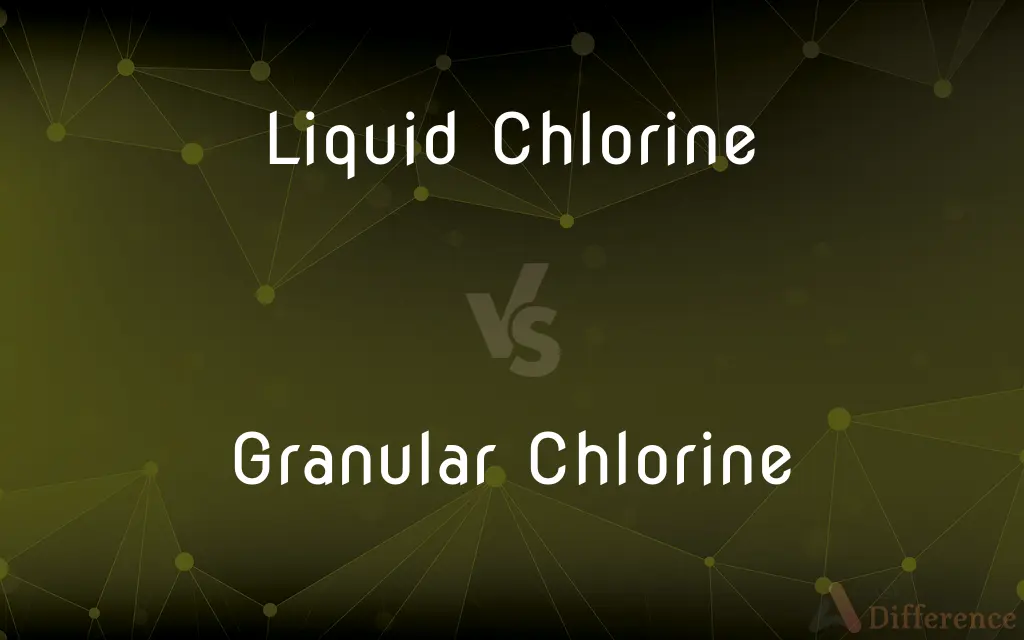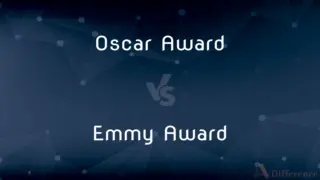Liquid Chlorine vs. Granular Chlorine — What's the Difference?
By Tayyaba Rehman — Published on November 12, 2023
Liquid Chlorine is chlorine in a liquid form often used for pool sanitation, while Granular Chlorine is chlorine in solid, granulated form also used for pool treatment.

Difference Between Liquid Chlorine and Granular Chlorine
Table of Contents
ADVERTISEMENT
Key Differences
Liquid Chlorine and Granular Chlorine are both forms of chlorine utilized for various sanitation and disinfection purposes, with their primary difference lying in their physical state. Liquid Chlorine, as the name suggests, is chlorine in a liquid form. It is typically sodium hypochlorite and is a common choice for daily pool chlorination because of its easy application. Granular Chlorine, on the other hand, is solid chlorine, usually in fine granules, that dissolves when introduced to water.
While both Liquid Chlorine and Granular Chlorine aim to provide a sanitized environment, their applications might differ slightly. Liquid Chlorine is often favored for its immediacy, as it mixes rapidly with water, providing instant chlorination. Conversely, Granular Chlorine might be chosen for "shocking" a pool or addressing specific contamination issues, as it can target specific areas and offers various dissolution rates based on granule size and formulation.
The concentration of active chlorine can vary between Liquid Chlorine and Granular Chlorine. Liquid Chlorine often has a lower concentration, around 10-15% of chlorine, while Granular Chlorine can range widely, with some types containing up to 90% chlorine. This makes dosage important, as the potency and effectiveness are contingent on the concentration.
Storage and shelf life are other areas where Liquid Chlorine and Granular Chlorine diverge. Liquid Chlorine can degrade faster when exposed to sunlight and may have a shorter shelf life. In contrast, when stored correctly in a cool, dry place, Granular Chlorine tends to have a longer shelf life, making it more suitable for infrequent use or bulk storage.
Comparison Chart
Physical State
Liquid
Solid (granulated)
ADVERTISEMENT
Typical Application
Daily pool chlorination
"Shocking" pools, targeted treatments
Concentration
Around 10-15% chlorine
Can range up to 90% chlorine
Shelf Life
Shorter, degrades faster in sunlight
Longer when stored correctly
Dissolution
Rapidly mixes with water
Varies based on granule size and formulation
Compare with Definitions
Liquid Chlorine
Liquid Chlorine may degrade faster when exposed to sunlight.
Store Liquid Chlorine in a shaded area to prolong its shelf life.
Granular Chlorine
Granular Chlorine has a longer shelf life when stored properly.
I bought Granular Chlorine in bulk because it stores well and lasts longer.
Liquid Chlorine
Liquid Chlorine is chlorine in a fluid state.
Many pool owners add Liquid Chlorine daily to maintain sanitation.
Granular Chlorine
Granular Chlorine comes in various concentrations, sometimes up to 90%.
Always read the label to determine the potency of the Granular Chlorine before using.
Liquid Chlorine
Liquid Chlorine often consists of sodium hypochlorite.
Liquid Chlorine, primarily sodium hypochlorite, is commonly used in household bleach.
Granular Chlorine
Granular Chlorine is often used for "shocking" pools.
Post a heavy swim day, I used Granular Chlorine to shock and thoroughly sanitize the pool.
Liquid Chlorine
Liquid Chlorine typically has a concentration of 10-15% chlorine.
Ensure you check the concentration before adding Liquid Chlorine to avoid over-chlorination.
Granular Chlorine
Granular Chlorine dissolves in water to release chlorine.
After adding Granular Chlorine to the pool, I saw it dissolve and start its sanitizing process.
Liquid Chlorine
Liquid Chlorine provides immediate chlorination upon addition.
When I noticed the pool was cloudy, I added Liquid Chlorine for instant effect.
Granular Chlorine
Granular Chlorine is chlorine in solid, grainy form.
I sprinkled Granular Chlorine over the pool's algae spots for targeted treatment.
Common Curiosities
Liquid Chlorine or Granular Chlorine?
While Liquid Chlorine typically contains 10-15% chlorine, Granular Chlorine can have concentrations up to 90%.
Can I use Liquid Chlorine for daily pool cleaning?
Yes, Liquid Chlorine is commonly chosen for daily pool chlorination because of its easy and immediate application.
Is Liquid Chlorine the same as household bleach?
While both might contain sodium hypochlorite, the concentration and purity can differ, so they shouldn't be used interchangeably.
What is Liquid Chlorine?
Liquid Chlorine is chlorine in a liquid form, often sodium hypochlorite, used for sanitation purposes.
How is Granular Chlorine different from Liquid Chlorine?
Granular Chlorine is solid, granulated chlorine, while Liquid Chlorine is in a fluid state.
Is Granular Chlorine effective for treating specific pool issues?
Yes, Granular Chlorine can target specific contamination areas, making it suitable for "shocking" a pool or treating particular issues.
How does Granular Chlorine work?
Granular Chlorine dissolves in water, releasing chlorine to sanitize and disinfect.
Is Granular Chlorine long-lasting?
Yes, when stored correctly in a cool, dry place, Granular Chlorine has a longer shelf life.
Can I use both Liquid and Granular Chlorine in my pool?
Yes, but it's essential to ensure the total chlorine levels remain within the recommended range.
How should I store Liquid Chlorine?
Liquid Chlorine should be stored in a cool, shaded place as it can degrade faster when exposed to sunlight.
Share Your Discovery

Previous Comparison
Wheat Germ vs. Wheat Bran
Next Comparison
Oscar Award vs. Emmy AwardAuthor Spotlight
Written by
Tayyaba RehmanTayyaba Rehman is a distinguished writer, currently serving as a primary contributor to askdifference.com. As a researcher in semantics and etymology, Tayyaba's passion for the complexity of languages and their distinctions has found a perfect home on the platform. Tayyaba delves into the intricacies of language, distinguishing between commonly confused words and phrases, thereby providing clarity for readers worldwide.












































